MSc Project Management: Analysis of CPD and Development Plan Report
VerifiedAdded on 2020/02/18
|24
|7620
|50
Report
AI Summary
This report presents an analysis of a student's Continuing Professional Development (CPD) journey within the context of an MSc in Project Management. The report begins with an executive summary and an introduction to CPD, detailing its process, outputs, and significance. It includes a Curriculum Vitae (CV) section, outlining project experiences and their impact on the student's skill development. The core of the report involves self-assessment using APM tools, identifying technical, behavioral, and contextual competence gaps, followed by a detailed development plan addressing these areas. The report also reflects on learning outcomes from the MSc program, professional activities, personal and work-based learning, and informal learning experiences, concluding with a summary of the overall CPD process and its impact on the student's career goals.
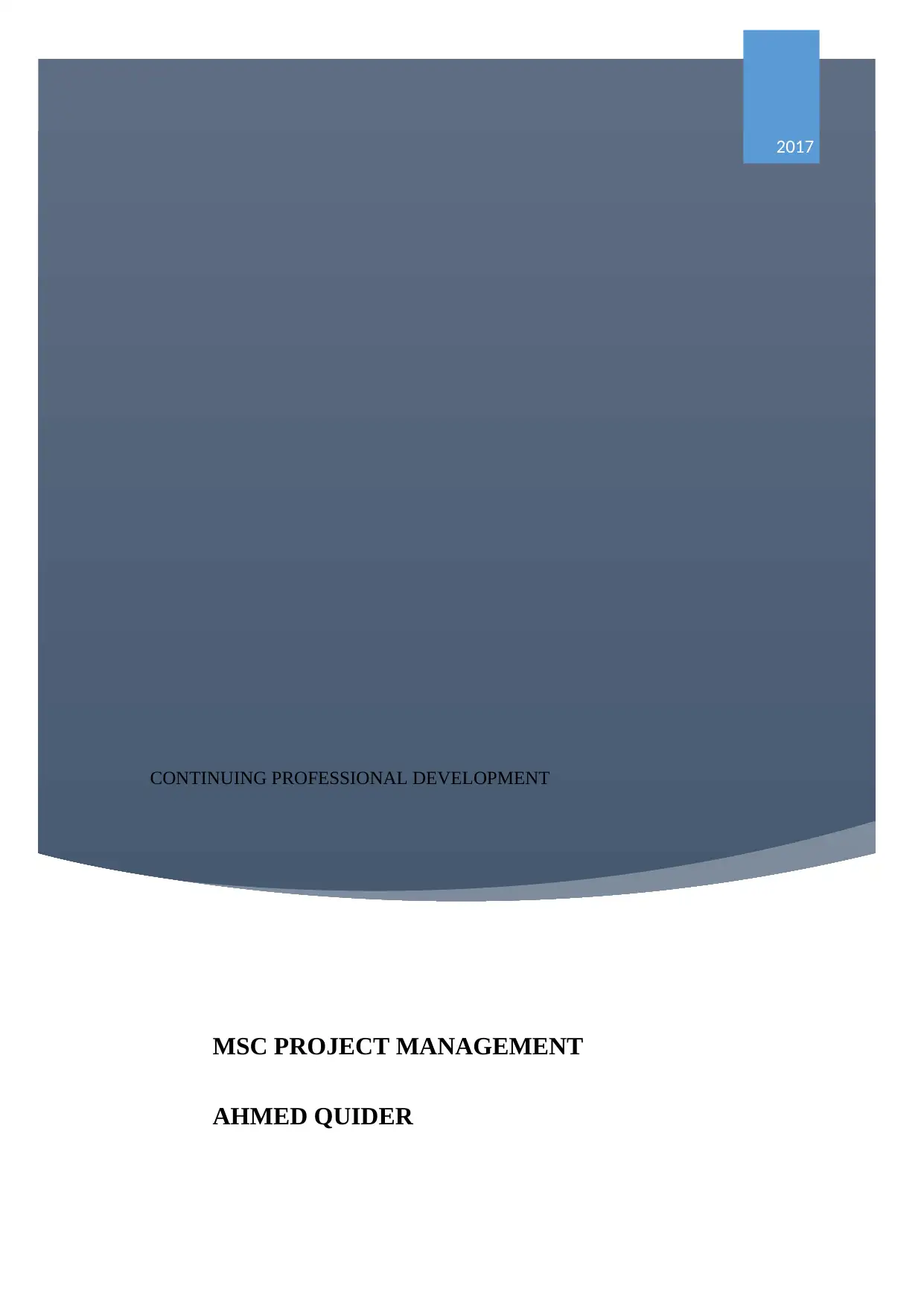
CONTINUING PROFESSIONAL DEVELOPMENT
2017
MSC PROJECT MANAGEMENT
AHMED QUIDER
2017
MSC PROJECT MANAGEMENT
AHMED QUIDER
Paraphrase This Document
Need a fresh take? Get an instant paraphrase of this document with our AI Paraphraser
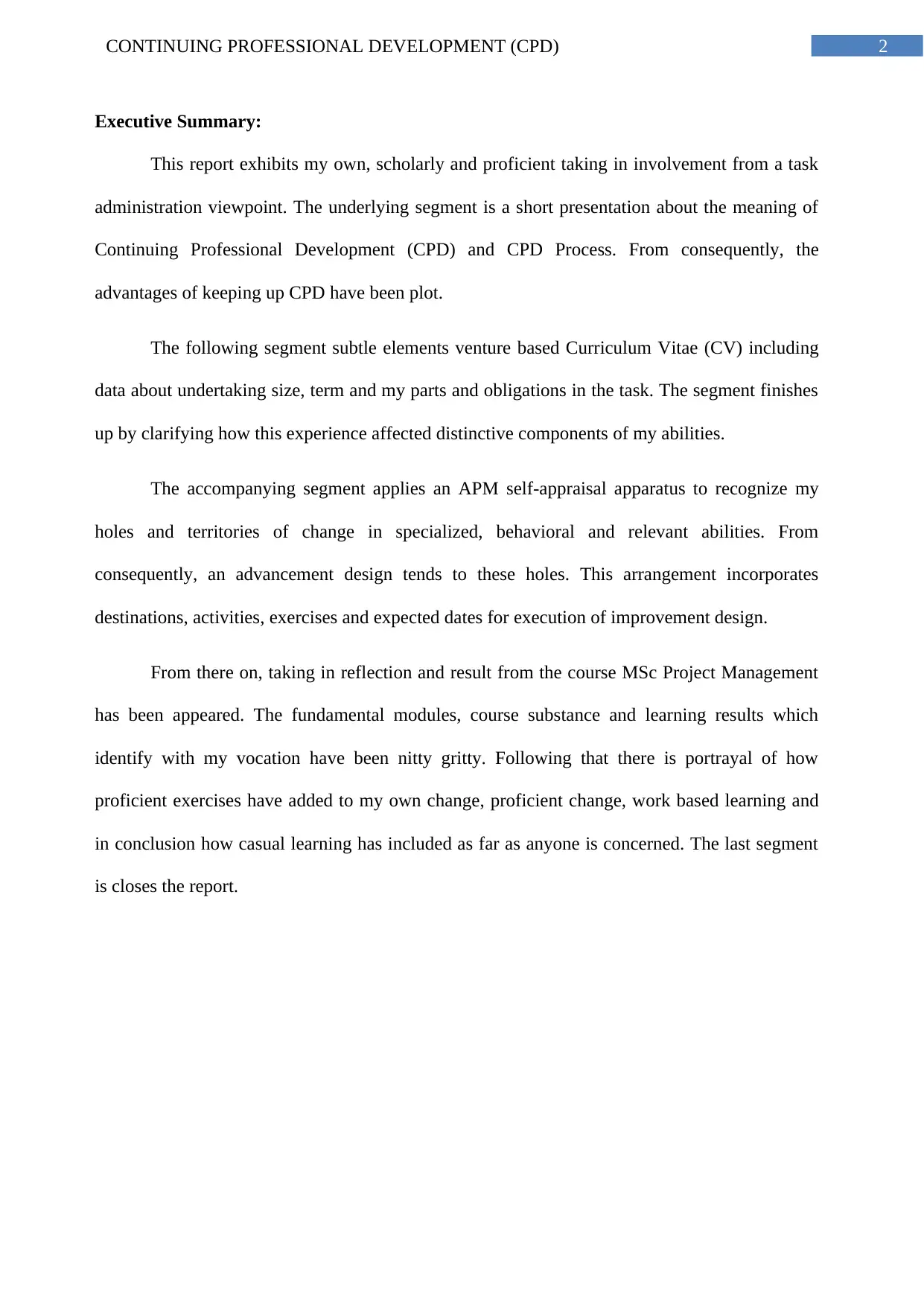
2CONTINUING PROFESSIONAL DEVELOPMENT (CPD)
Executive Summary:
This report exhibits my own, scholarly and proficient taking in involvement from a task
administration viewpoint. The underlying segment is a short presentation about the meaning of
Continuing Professional Development (CPD) and CPD Process. From consequently, the
advantages of keeping up CPD have been plot.
The following segment subtle elements venture based Curriculum Vitae (CV) including
data about undertaking size, term and my parts and obligations in the task. The segment finishes
up by clarifying how this experience affected distinctive components of my abilities.
The accompanying segment applies an APM self-appraisal apparatus to recognize my
holes and territories of change in specialized, behavioral and relevant abilities. From
consequently, an advancement design tends to these holes. This arrangement incorporates
destinations, activities, exercises and expected dates for execution of improvement design.
From there on, taking in reflection and result from the course MSc Project Management
has been appeared. The fundamental modules, course substance and learning results which
identify with my vocation have been nitty gritty. Following that there is portrayal of how
proficient exercises have added to my own change, proficient change, work based learning and
in conclusion how casual learning has included as far as anyone is concerned. The last segment
is closes the report.
Executive Summary:
This report exhibits my own, scholarly and proficient taking in involvement from a task
administration viewpoint. The underlying segment is a short presentation about the meaning of
Continuing Professional Development (CPD) and CPD Process. From consequently, the
advantages of keeping up CPD have been plot.
The following segment subtle elements venture based Curriculum Vitae (CV) including
data about undertaking size, term and my parts and obligations in the task. The segment finishes
up by clarifying how this experience affected distinctive components of my abilities.
The accompanying segment applies an APM self-appraisal apparatus to recognize my
holes and territories of change in specialized, behavioral and relevant abilities. From
consequently, an advancement design tends to these holes. This arrangement incorporates
destinations, activities, exercises and expected dates for execution of improvement design.
From there on, taking in reflection and result from the course MSc Project Management
has been appeared. The fundamental modules, course substance and learning results which
identify with my vocation have been nitty gritty. Following that there is portrayal of how
proficient exercises have added to my own change, proficient change, work based learning and
in conclusion how casual learning has included as far as anyone is concerned. The last segment
is closes the report.
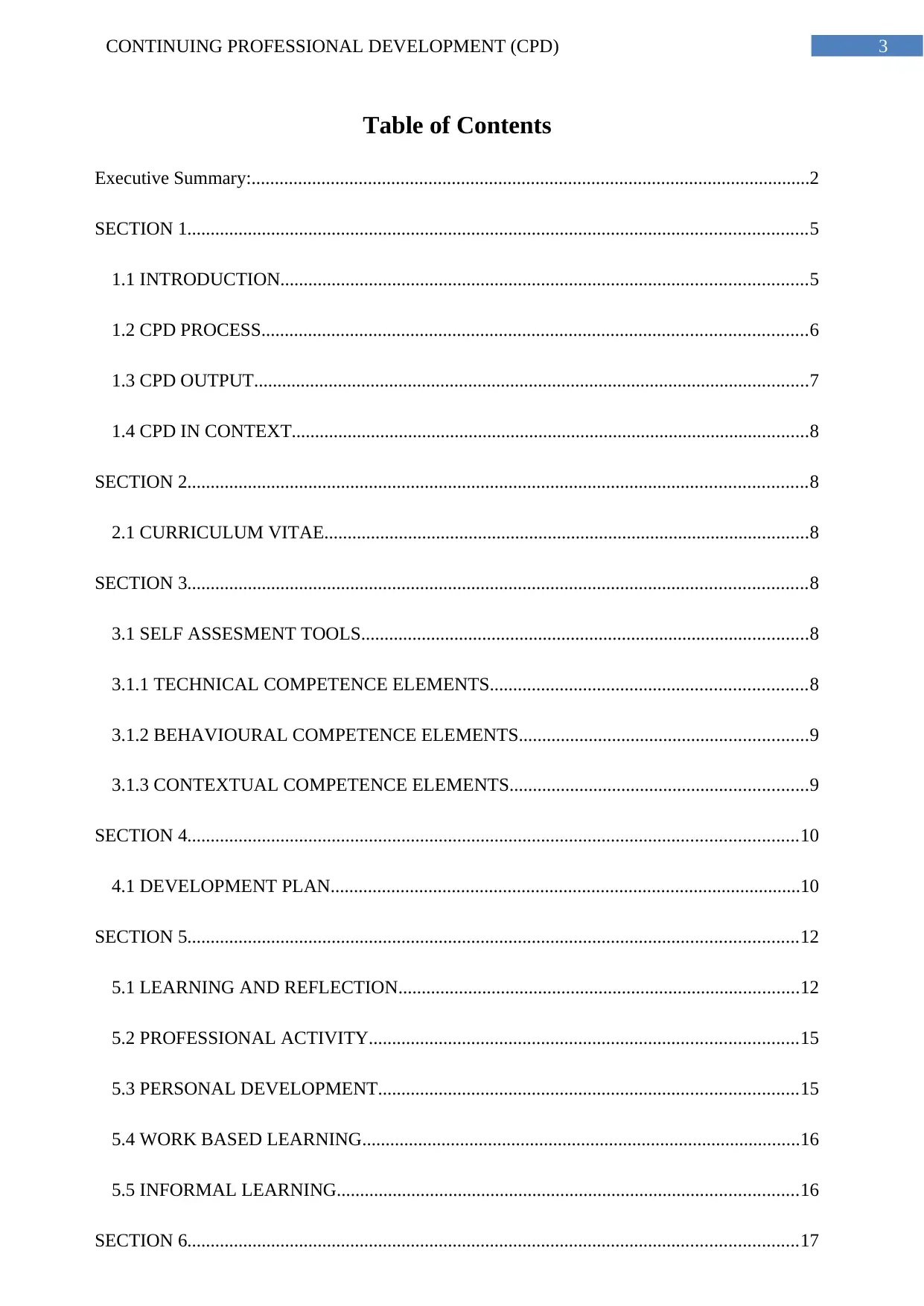
3CONTINUING PROFESSIONAL DEVELOPMENT (CPD)
Table of Contents
Executive Summary:........................................................................................................................2
SECTION 1.....................................................................................................................................5
1.1 INTRODUCTION.................................................................................................................5
1.2 CPD PROCESS.....................................................................................................................6
1.3 CPD OUTPUT.......................................................................................................................7
1.4 CPD IN CONTEXT...............................................................................................................8
SECTION 2.....................................................................................................................................8
2.1 CURRICULUM VITAE........................................................................................................8
SECTION 3.....................................................................................................................................8
3.1 SELF ASSESMENT TOOLS................................................................................................8
3.1.1 TECHNICAL COMPETENCE ELEMENTS....................................................................8
3.1.2 BEHAVIOURAL COMPETENCE ELEMENTS..............................................................9
3.1.3 CONTEXTUAL COMPETENCE ELEMENTS................................................................9
SECTION 4...................................................................................................................................10
4.1 DEVELOPMENT PLAN.....................................................................................................10
SECTION 5...................................................................................................................................12
5.1 LEARNING AND REFLECTION......................................................................................12
5.2 PROFESSIONAL ACTIVITY............................................................................................15
5.3 PERSONAL DEVELOPMENT..........................................................................................15
5.4 WORK BASED LEARNING..............................................................................................16
5.5 INFORMAL LEARNING...................................................................................................16
SECTION 6...................................................................................................................................17
Table of Contents
Executive Summary:........................................................................................................................2
SECTION 1.....................................................................................................................................5
1.1 INTRODUCTION.................................................................................................................5
1.2 CPD PROCESS.....................................................................................................................6
1.3 CPD OUTPUT.......................................................................................................................7
1.4 CPD IN CONTEXT...............................................................................................................8
SECTION 2.....................................................................................................................................8
2.1 CURRICULUM VITAE........................................................................................................8
SECTION 3.....................................................................................................................................8
3.1 SELF ASSESMENT TOOLS................................................................................................8
3.1.1 TECHNICAL COMPETENCE ELEMENTS....................................................................8
3.1.2 BEHAVIOURAL COMPETENCE ELEMENTS..............................................................9
3.1.3 CONTEXTUAL COMPETENCE ELEMENTS................................................................9
SECTION 4...................................................................................................................................10
4.1 DEVELOPMENT PLAN.....................................................................................................10
SECTION 5...................................................................................................................................12
5.1 LEARNING AND REFLECTION......................................................................................12
5.2 PROFESSIONAL ACTIVITY............................................................................................15
5.3 PERSONAL DEVELOPMENT..........................................................................................15
5.4 WORK BASED LEARNING..............................................................................................16
5.5 INFORMAL LEARNING...................................................................................................16
SECTION 6...................................................................................................................................17
⊘ This is a preview!⊘
Do you want full access?
Subscribe today to unlock all pages.

Trusted by 1+ million students worldwide
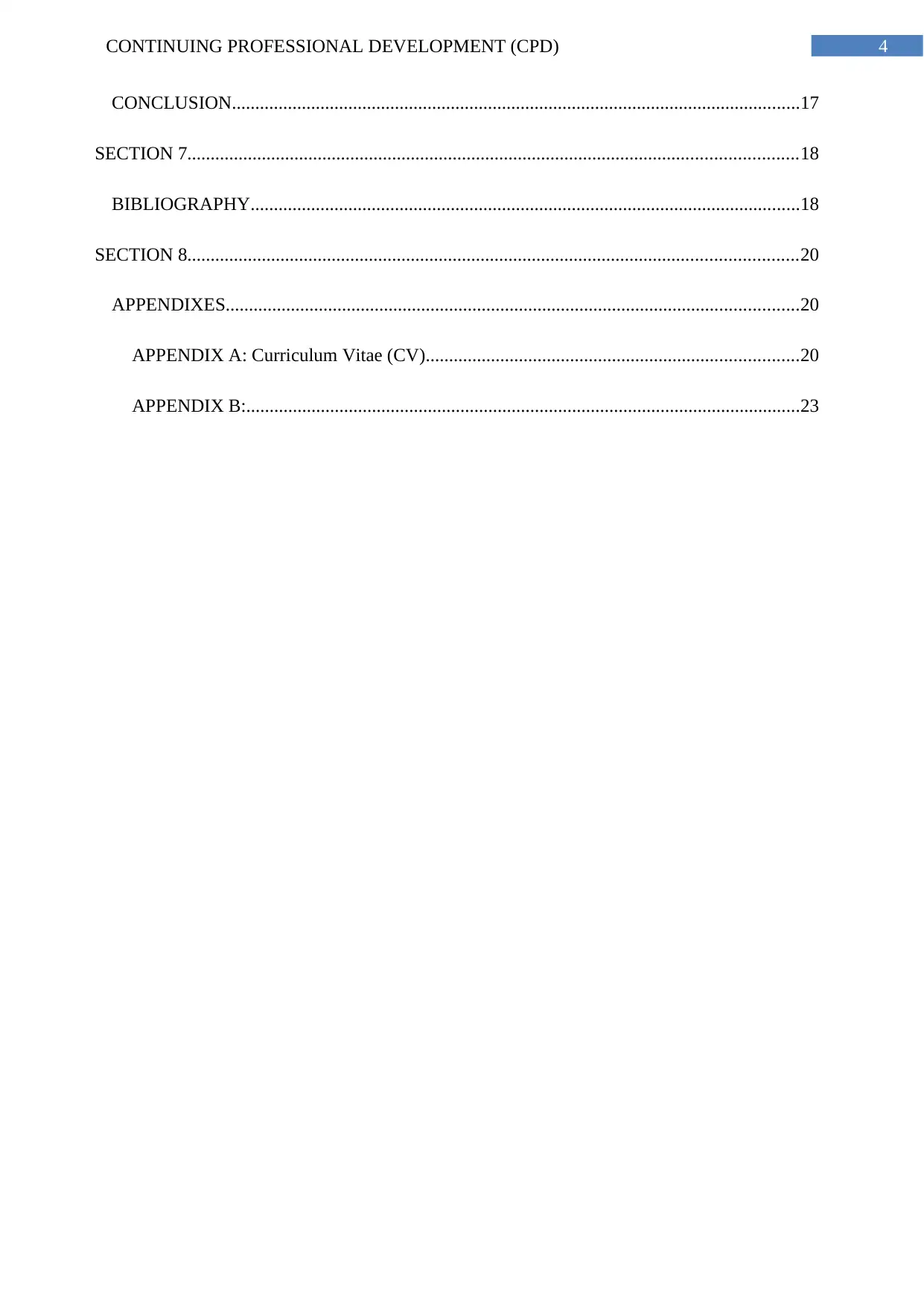
4CONTINUING PROFESSIONAL DEVELOPMENT (CPD)
CONCLUSION..........................................................................................................................17
SECTION 7...................................................................................................................................18
BIBLIOGRAPHY......................................................................................................................18
SECTION 8...................................................................................................................................20
APPENDIXES...........................................................................................................................20
APPENDIX A: Curriculum Vitae (CV)................................................................................20
APPENDIX B:.......................................................................................................................23
CONCLUSION..........................................................................................................................17
SECTION 7...................................................................................................................................18
BIBLIOGRAPHY......................................................................................................................18
SECTION 8...................................................................................................................................20
APPENDIXES...........................................................................................................................20
APPENDIX A: Curriculum Vitae (CV)................................................................................20
APPENDIX B:.......................................................................................................................23
Paraphrase This Document
Need a fresh take? Get an instant paraphrase of this document with our AI Paraphraser
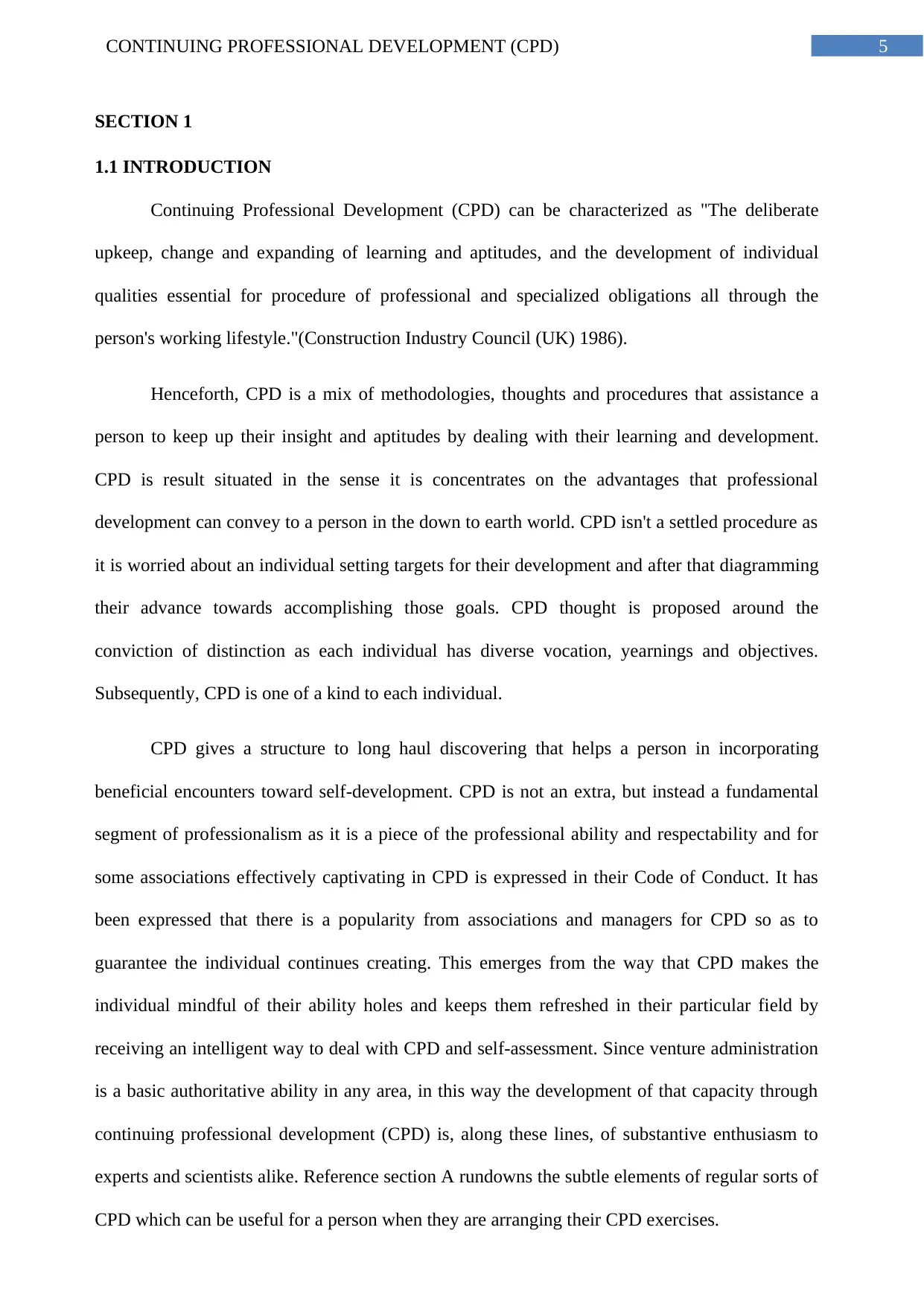
5CONTINUING PROFESSIONAL DEVELOPMENT (CPD)
SECTION 1
1.1 INTRODUCTION
Continuing Professional Development (CPD) can be characterized as "The deliberate
upkeep, change and expanding of learning and aptitudes, and the development of individual
qualities essential for procedure of professional and specialized obligations all through the
person's working lifestyle."(Construction Industry Council (UK) 1986).
Henceforth, CPD is a mix of methodologies, thoughts and procedures that assistance a
person to keep up their insight and aptitudes by dealing with their learning and development.
CPD is result situated in the sense it is concentrates on the advantages that professional
development can convey to a person in the down to earth world. CPD isn't a settled procedure as
it is worried about an individual setting targets for their development and after that diagramming
their advance towards accomplishing those goals. CPD thought is proposed around the
conviction of distinction as each individual has diverse vocation, yearnings and objectives.
Subsequently, CPD is one of a kind to each individual.
CPD gives a structure to long haul discovering that helps a person in incorporating
beneficial encounters toward self-development. CPD is not an extra, but instead a fundamental
segment of professionalism as it is a piece of the professional ability and respectability and for
some associations effectively captivating in CPD is expressed in their Code of Conduct. It has
been expressed that there is a popularity from associations and managers for CPD so as to
guarantee the individual continues creating. This emerges from the way that CPD makes the
individual mindful of their ability holes and keeps them refreshed in their particular field by
receiving an intelligent way to deal with CPD and self-assessment. Since venture administration
is a basic authoritative ability in any area, in this way the development of that capacity through
continuing professional development (CPD) is, along these lines, of substantive enthusiasm to
experts and scientists alike. Reference section A rundowns the subtle elements of regular sorts of
CPD which can be useful for a person when they are arranging their CPD exercises.
SECTION 1
1.1 INTRODUCTION
Continuing Professional Development (CPD) can be characterized as "The deliberate
upkeep, change and expanding of learning and aptitudes, and the development of individual
qualities essential for procedure of professional and specialized obligations all through the
person's working lifestyle."(Construction Industry Council (UK) 1986).
Henceforth, CPD is a mix of methodologies, thoughts and procedures that assistance a
person to keep up their insight and aptitudes by dealing with their learning and development.
CPD is result situated in the sense it is concentrates on the advantages that professional
development can convey to a person in the down to earth world. CPD isn't a settled procedure as
it is worried about an individual setting targets for their development and after that diagramming
their advance towards accomplishing those goals. CPD thought is proposed around the
conviction of distinction as each individual has diverse vocation, yearnings and objectives.
Subsequently, CPD is one of a kind to each individual.
CPD gives a structure to long haul discovering that helps a person in incorporating
beneficial encounters toward self-development. CPD is not an extra, but instead a fundamental
segment of professionalism as it is a piece of the professional ability and respectability and for
some associations effectively captivating in CPD is expressed in their Code of Conduct. It has
been expressed that there is a popularity from associations and managers for CPD so as to
guarantee the individual continues creating. This emerges from the way that CPD makes the
individual mindful of their ability holes and keeps them refreshed in their particular field by
receiving an intelligent way to deal with CPD and self-assessment. Since venture administration
is a basic authoritative ability in any area, in this way the development of that capacity through
continuing professional development (CPD) is, along these lines, of substantive enthusiasm to
experts and scientists alike. Reference section A rundowns the subtle elements of regular sorts of
CPD which can be useful for a person when they are arranging their CPD exercises.
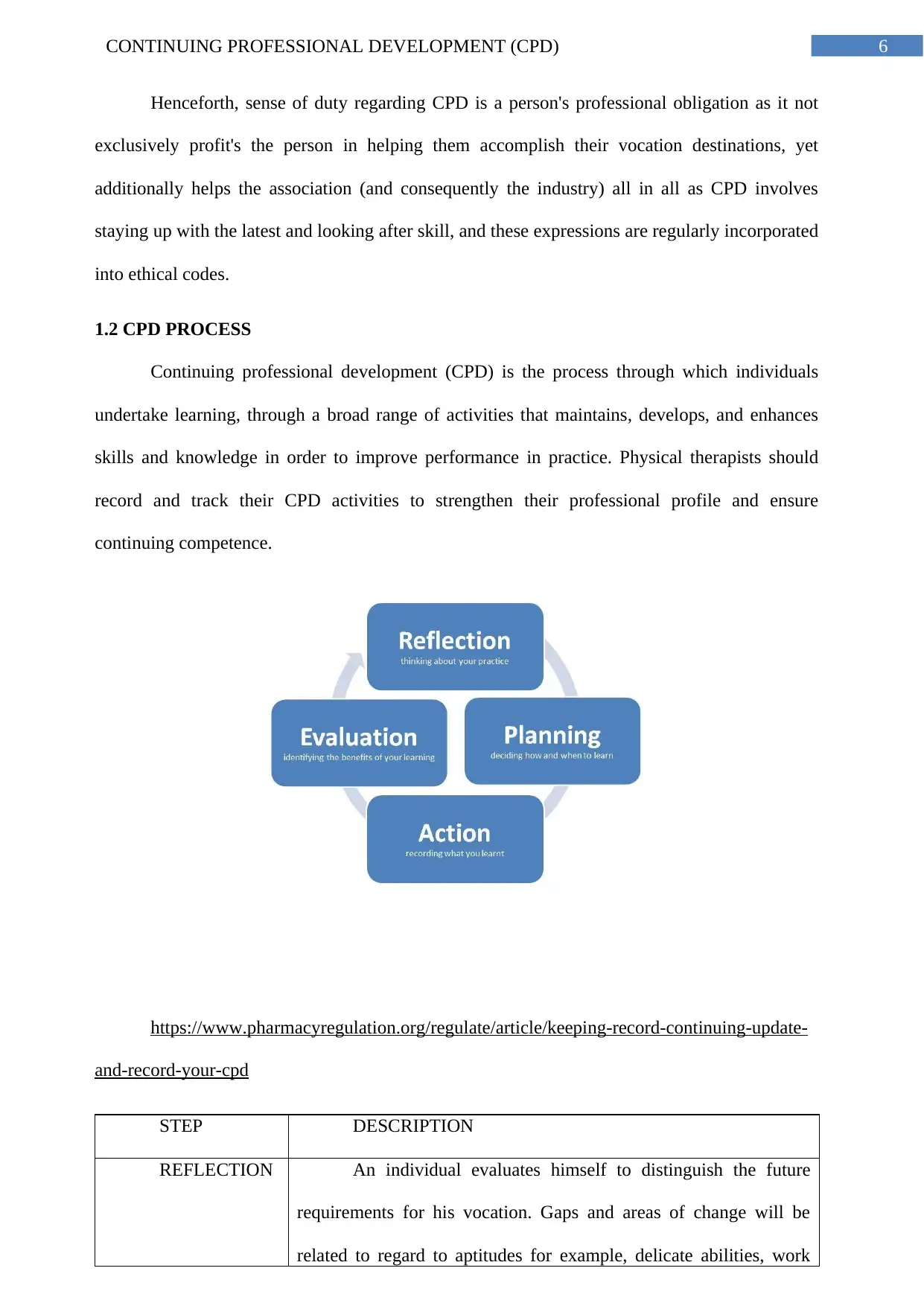
6CONTINUING PROFESSIONAL DEVELOPMENT (CPD)
Henceforth, sense of duty regarding CPD is a person's professional obligation as it not
exclusively profit's the person in helping them accomplish their vocation destinations, yet
additionally helps the association (and consequently the industry) all in all as CPD involves
staying up with the latest and looking after skill, and these expressions are regularly incorporated
into ethical codes.
1.2 CPD PROCESS
Continuing professional development (CPD) is the process through which individuals
undertake learning, through a broad range of activities that maintains, develops, and enhances
skills and knowledge in order to improve performance in practice. Physical therapists should
record and track their CPD activities to strengthen their professional profile and ensure
continuing competence.
https://www.pharmacyregulation.org/regulate/article/keeping-record-continuing-update-
and-record-your-cpd
STEP DESCRIPTION
REFLECTION An individual evaluates himself to distinguish the future
requirements for his vocation. Gaps and areas of change will be
related to regard to aptitudes for example, delicate abilities, work
Henceforth, sense of duty regarding CPD is a person's professional obligation as it not
exclusively profit's the person in helping them accomplish their vocation destinations, yet
additionally helps the association (and consequently the industry) all in all as CPD involves
staying up with the latest and looking after skill, and these expressions are regularly incorporated
into ethical codes.
1.2 CPD PROCESS
Continuing professional development (CPD) is the process through which individuals
undertake learning, through a broad range of activities that maintains, develops, and enhances
skills and knowledge in order to improve performance in practice. Physical therapists should
record and track their CPD activities to strengthen their professional profile and ensure
continuing competence.
https://www.pharmacyregulation.org/regulate/article/keeping-record-continuing-update-
and-record-your-cpd
STEP DESCRIPTION
REFLECTION An individual evaluates himself to distinguish the future
requirements for his vocation. Gaps and areas of change will be
related to regard to aptitudes for example, delicate abilities, work
⊘ This is a preview!⊘
Do you want full access?
Subscribe today to unlock all pages.

Trusted by 1+ million students worldwide
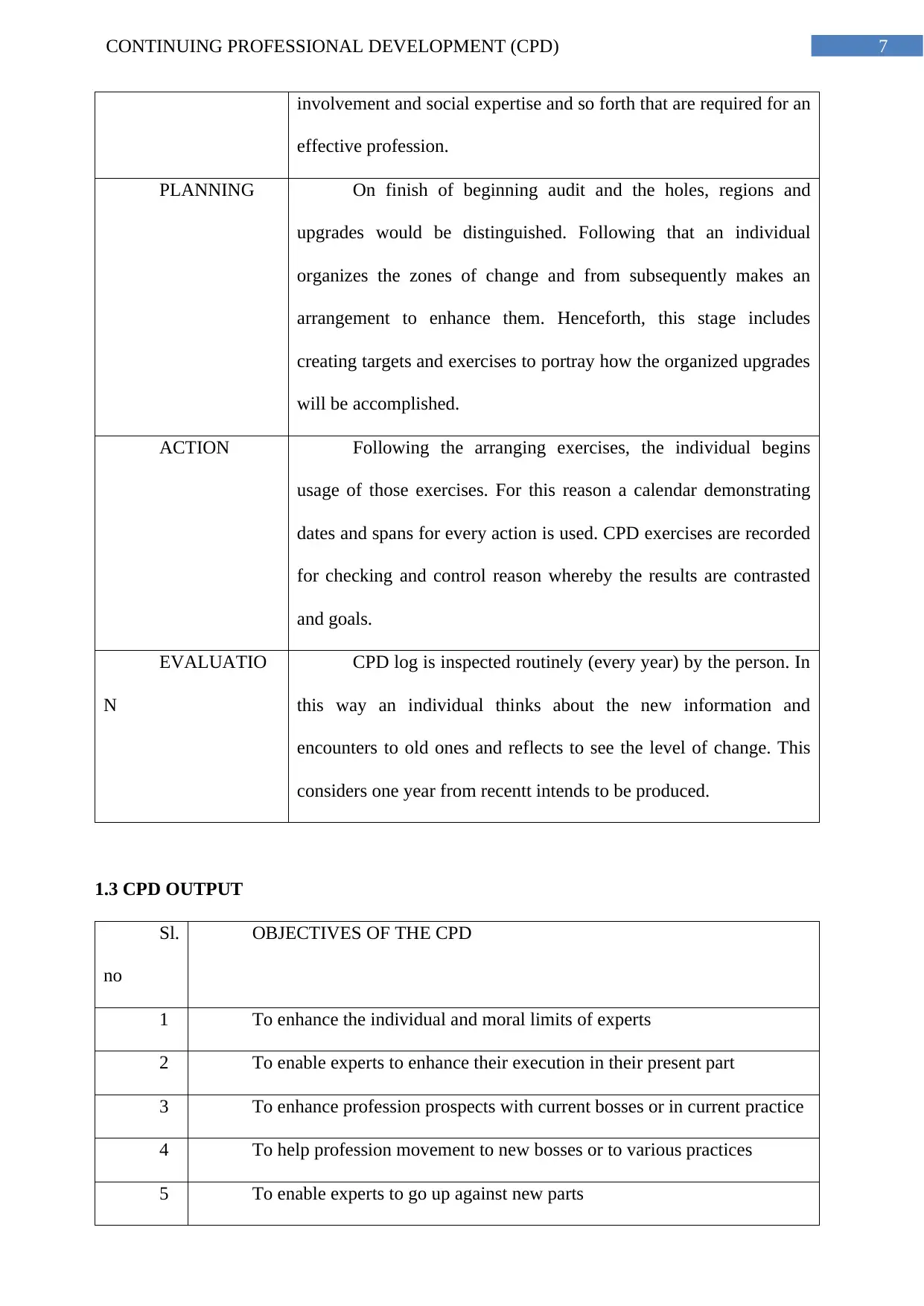
7CONTINUING PROFESSIONAL DEVELOPMENT (CPD)
involvement and social expertise and so forth that are required for an
effective profession.
PLANNING On finish of beginning audit and the holes, regions and
upgrades would be distinguished. Following that an individual
organizes the zones of change and from subsequently makes an
arrangement to enhance them. Henceforth, this stage includes
creating targets and exercises to portray how the organized upgrades
will be accomplished.
ACTION Following the arranging exercises, the individual begins
usage of those exercises. For this reason a calendar demonstrating
dates and spans for every action is used. CPD exercises are recorded
for checking and control reason whereby the results are contrasted
and goals.
EVALUATIO
N
CPD log is inspected routinely (every year) by the person. In
this way an individual thinks about the new information and
encounters to old ones and reflects to see the level of change. This
considers one year from recentt intends to be produced.
1.3 CPD OUTPUT
Sl.
no
OBJECTIVES OF THE CPD
1 To enhance the individual and moral limits of experts
2 To enable experts to enhance their execution in their present part
3 To enhance profession prospects with current bosses or in current practice
4 To help profession movement to new bosses or to various practices
5 To enable experts to go up against new parts
involvement and social expertise and so forth that are required for an
effective profession.
PLANNING On finish of beginning audit and the holes, regions and
upgrades would be distinguished. Following that an individual
organizes the zones of change and from subsequently makes an
arrangement to enhance them. Henceforth, this stage includes
creating targets and exercises to portray how the organized upgrades
will be accomplished.
ACTION Following the arranging exercises, the individual begins
usage of those exercises. For this reason a calendar demonstrating
dates and spans for every action is used. CPD exercises are recorded
for checking and control reason whereby the results are contrasted
and goals.
EVALUATIO
N
CPD log is inspected routinely (every year) by the person. In
this way an individual thinks about the new information and
encounters to old ones and reflects to see the level of change. This
considers one year from recentt intends to be produced.
1.3 CPD OUTPUT
Sl.
no
OBJECTIVES OF THE CPD
1 To enhance the individual and moral limits of experts
2 To enable experts to enhance their execution in their present part
3 To enhance profession prospects with current bosses or in current practice
4 To help profession movement to new bosses or to various practices
5 To enable experts to go up against new parts
Paraphrase This Document
Need a fresh take? Get an instant paraphrase of this document with our AI Paraphraser
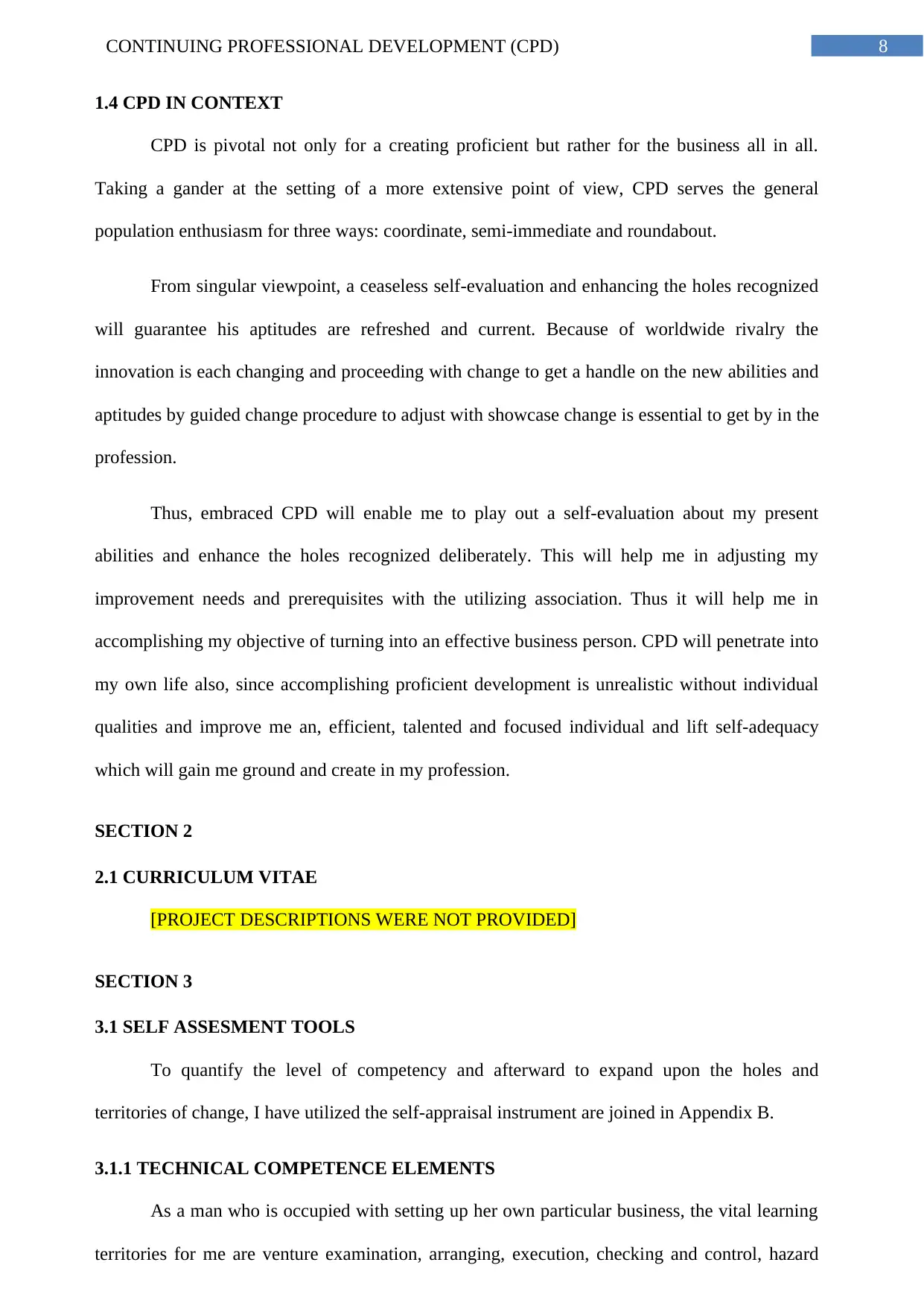
8CONTINUING PROFESSIONAL DEVELOPMENT (CPD)
1.4 CPD IN CONTEXT
CPD is pivotal not only for a creating proficient but rather for the business all in all.
Taking a gander at the setting of a more extensive point of view, CPD serves the general
population enthusiasm for three ways: coordinate, semi-immediate and roundabout.
From singular viewpoint, a ceaseless self-evaluation and enhancing the holes recognized
will guarantee his aptitudes are refreshed and current. Because of worldwide rivalry the
innovation is each changing and proceeding with change to get a handle on the new abilities and
aptitudes by guided change procedure to adjust with showcase change is essential to get by in the
profession.
Thus, embraced CPD will enable me to play out a self-evaluation about my present
abilities and enhance the holes recognized deliberately. This will help me in adjusting my
improvement needs and prerequisites with the utilizing association. Thus it will help me in
accomplishing my objective of turning into an effective business person. CPD will penetrate into
my own life also, since accomplishing proficient development is unrealistic without individual
qualities and improve me an, efficient, talented and focused individual and lift self-adequacy
which will gain me ground and create in my profession.
SECTION 2
2.1 CURRICULUM VITAE
[PROJECT DESCRIPTIONS WERE NOT PROVIDED]
SECTION 3
3.1 SELF ASSESMENT TOOLS
To quantify the level of competency and afterward to expand upon the holes and
territories of change, I have utilized the self-appraisal instrument are joined in Appendix B.
3.1.1 TECHNICAL COMPETENCE ELEMENTS
As a man who is occupied with setting up her own particular business, the vital learning
territories for me are venture examination, arranging, execution, checking and control, hazard
1.4 CPD IN CONTEXT
CPD is pivotal not only for a creating proficient but rather for the business all in all.
Taking a gander at the setting of a more extensive point of view, CPD serves the general
population enthusiasm for three ways: coordinate, semi-immediate and roundabout.
From singular viewpoint, a ceaseless self-evaluation and enhancing the holes recognized
will guarantee his aptitudes are refreshed and current. Because of worldwide rivalry the
innovation is each changing and proceeding with change to get a handle on the new abilities and
aptitudes by guided change procedure to adjust with showcase change is essential to get by in the
profession.
Thus, embraced CPD will enable me to play out a self-evaluation about my present
abilities and enhance the holes recognized deliberately. This will help me in adjusting my
improvement needs and prerequisites with the utilizing association. Thus it will help me in
accomplishing my objective of turning into an effective business person. CPD will penetrate into
my own life also, since accomplishing proficient development is unrealistic without individual
qualities and improve me an, efficient, talented and focused individual and lift self-adequacy
which will gain me ground and create in my profession.
SECTION 2
2.1 CURRICULUM VITAE
[PROJECT DESCRIPTIONS WERE NOT PROVIDED]
SECTION 3
3.1 SELF ASSESMENT TOOLS
To quantify the level of competency and afterward to expand upon the holes and
territories of change, I have utilized the self-appraisal instrument are joined in Appendix B.
3.1.1 TECHNICAL COMPETENCE ELEMENTS
As a man who is occupied with setting up her own particular business, the vital learning
territories for me are venture examination, arranging, execution, checking and control, hazard
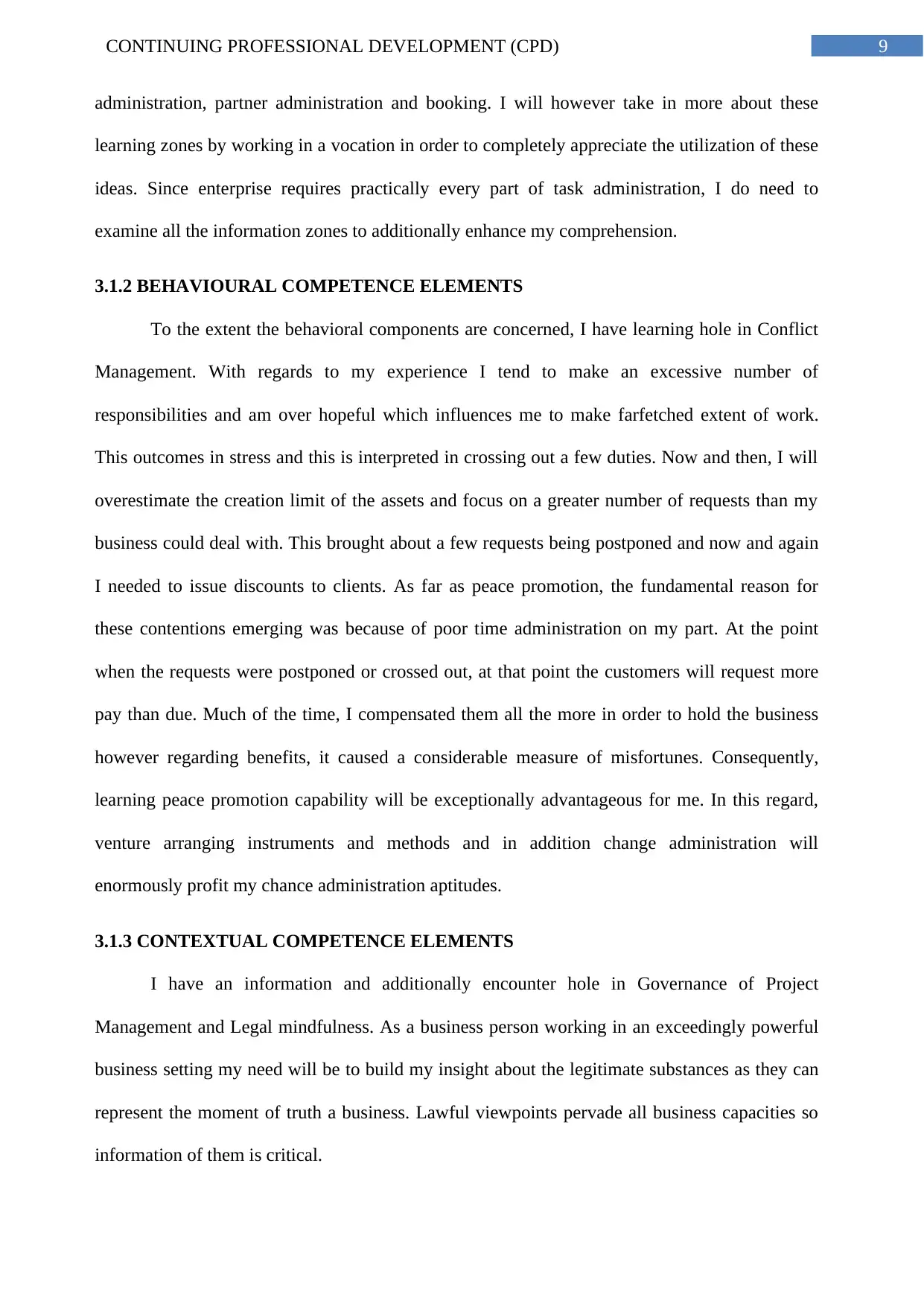
9CONTINUING PROFESSIONAL DEVELOPMENT (CPD)
administration, partner administration and booking. I will however take in more about these
learning zones by working in a vocation in order to completely appreciate the utilization of these
ideas. Since enterprise requires practically every part of task administration, I do need to
examine all the information zones to additionally enhance my comprehension.
3.1.2 BEHAVIOURAL COMPETENCE ELEMENTS
To the extent the behavioral components are concerned, I have learning hole in Conflict
Management. With regards to my experience I tend to make an excessive number of
responsibilities and am over hopeful which influences me to make farfetched extent of work.
This outcomes in stress and this is interpreted in crossing out a few duties. Now and then, I will
overestimate the creation limit of the assets and focus on a greater number of requests than my
business could deal with. This brought about a few requests being postponed and now and again
I needed to issue discounts to clients. As far as peace promotion, the fundamental reason for
these contentions emerging was because of poor time administration on my part. At the point
when the requests were postponed or crossed out, at that point the customers will request more
pay than due. Much of the time, I compensated them all the more in order to hold the business
however regarding benefits, it caused a considerable measure of misfortunes. Consequently,
learning peace promotion capability will be exceptionally advantageous for me. In this regard,
venture arranging instruments and methods and in addition change administration will
enormously profit my chance administration aptitudes.
3.1.3 CONTEXTUAL COMPETENCE ELEMENTS
I have an information and additionally encounter hole in Governance of Project
Management and Legal mindfulness. As a business person working in an exceedingly powerful
business setting my need will be to build my insight about the legitimate substances as they can
represent the moment of truth a business. Lawful viewpoints pervade all business capacities so
information of them is critical.
administration, partner administration and booking. I will however take in more about these
learning zones by working in a vocation in order to completely appreciate the utilization of these
ideas. Since enterprise requires practically every part of task administration, I do need to
examine all the information zones to additionally enhance my comprehension.
3.1.2 BEHAVIOURAL COMPETENCE ELEMENTS
To the extent the behavioral components are concerned, I have learning hole in Conflict
Management. With regards to my experience I tend to make an excessive number of
responsibilities and am over hopeful which influences me to make farfetched extent of work.
This outcomes in stress and this is interpreted in crossing out a few duties. Now and then, I will
overestimate the creation limit of the assets and focus on a greater number of requests than my
business could deal with. This brought about a few requests being postponed and now and again
I needed to issue discounts to clients. As far as peace promotion, the fundamental reason for
these contentions emerging was because of poor time administration on my part. At the point
when the requests were postponed or crossed out, at that point the customers will request more
pay than due. Much of the time, I compensated them all the more in order to hold the business
however regarding benefits, it caused a considerable measure of misfortunes. Consequently,
learning peace promotion capability will be exceptionally advantageous for me. In this regard,
venture arranging instruments and methods and in addition change administration will
enormously profit my chance administration aptitudes.
3.1.3 CONTEXTUAL COMPETENCE ELEMENTS
I have an information and additionally encounter hole in Governance of Project
Management and Legal mindfulness. As a business person working in an exceedingly powerful
business setting my need will be to build my insight about the legitimate substances as they can
represent the moment of truth a business. Lawful viewpoints pervade all business capacities so
information of them is critical.
⊘ This is a preview!⊘
Do you want full access?
Subscribe today to unlock all pages.

Trusted by 1+ million students worldwide
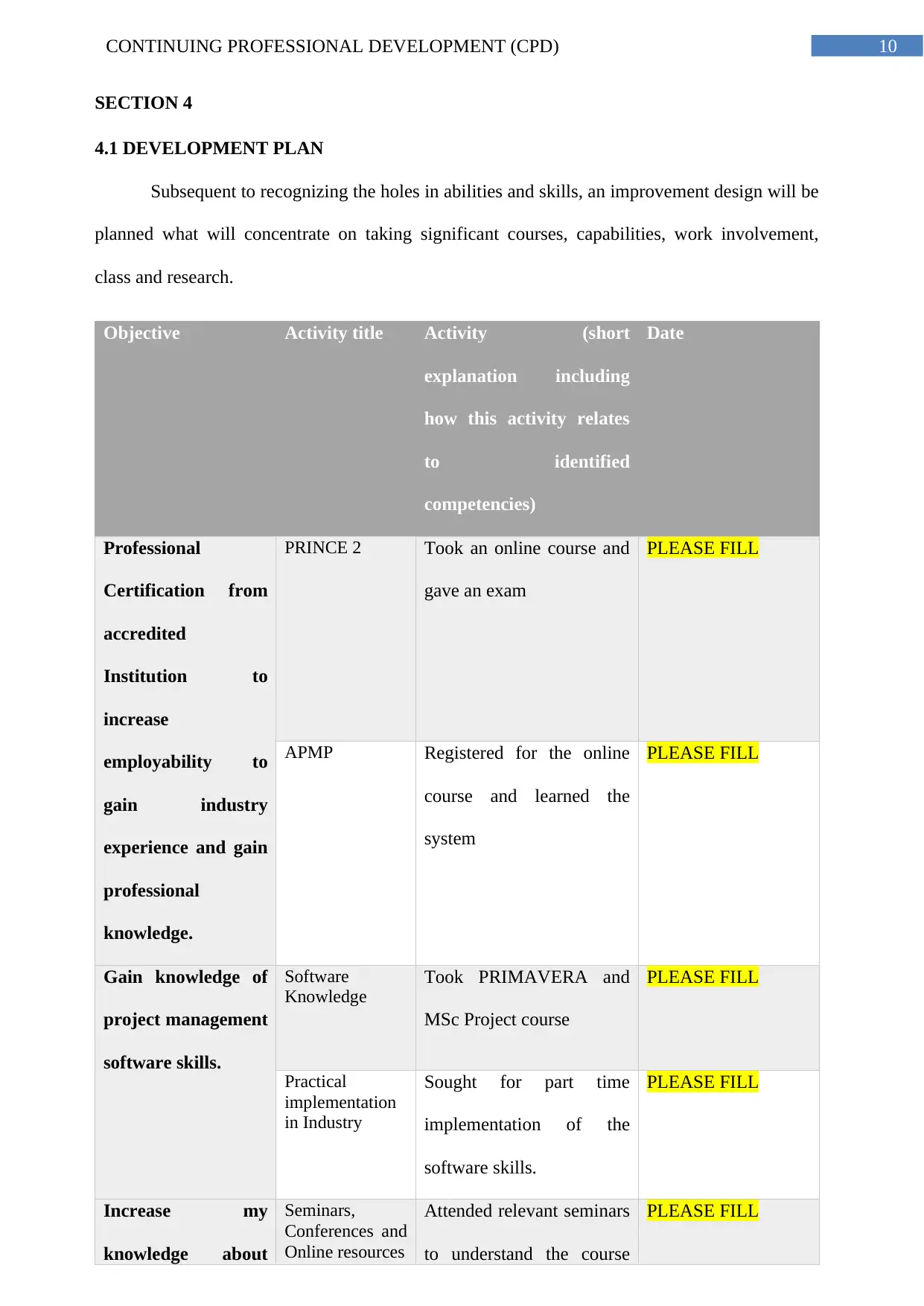
10CONTINUING PROFESSIONAL DEVELOPMENT (CPD)
SECTION 4
4.1 DEVELOPMENT PLAN
Subsequent to recognizing the holes in abilities and skills, an improvement design will be
planned what will concentrate on taking significant courses, capabilities, work involvement,
class and research.
Objective Activity title Activity (short
explanation including
how this activity relates
to identified
competencies)
Date
Professional
Certification from
accredited
Institution to
increase
employability to
gain industry
experience and gain
professional
knowledge.
PRINCE 2 Took an online course and
gave an exam
PLEASE FILL
APMP Registered for the online
course and learned the
system
PLEASE FILL
Gain knowledge of
project management
software skills.
Software
Knowledge
Took PRIMAVERA and
MSc Project course
PLEASE FILL
Practical
implementation
in Industry
Sought for part time
implementation of the
software skills.
PLEASE FILL
Increase my
knowledge about
Seminars,
Conferences and
Online resources
Attended relevant seminars
to understand the course
PLEASE FILL
SECTION 4
4.1 DEVELOPMENT PLAN
Subsequent to recognizing the holes in abilities and skills, an improvement design will be
planned what will concentrate on taking significant courses, capabilities, work involvement,
class and research.
Objective Activity title Activity (short
explanation including
how this activity relates
to identified
competencies)
Date
Professional
Certification from
accredited
Institution to
increase
employability to
gain industry
experience and gain
professional
knowledge.
PRINCE 2 Took an online course and
gave an exam
PLEASE FILL
APMP Registered for the online
course and learned the
system
PLEASE FILL
Gain knowledge of
project management
software skills.
Software
Knowledge
Took PRIMAVERA and
MSc Project course
PLEASE FILL
Practical
implementation
in Industry
Sought for part time
implementation of the
software skills.
PLEASE FILL
Increase my
knowledge about
Seminars,
Conferences and
Online resources
Attended relevant seminars
to understand the course
PLEASE FILL
Paraphrase This Document
Need a fresh take? Get an instant paraphrase of this document with our AI Paraphraser
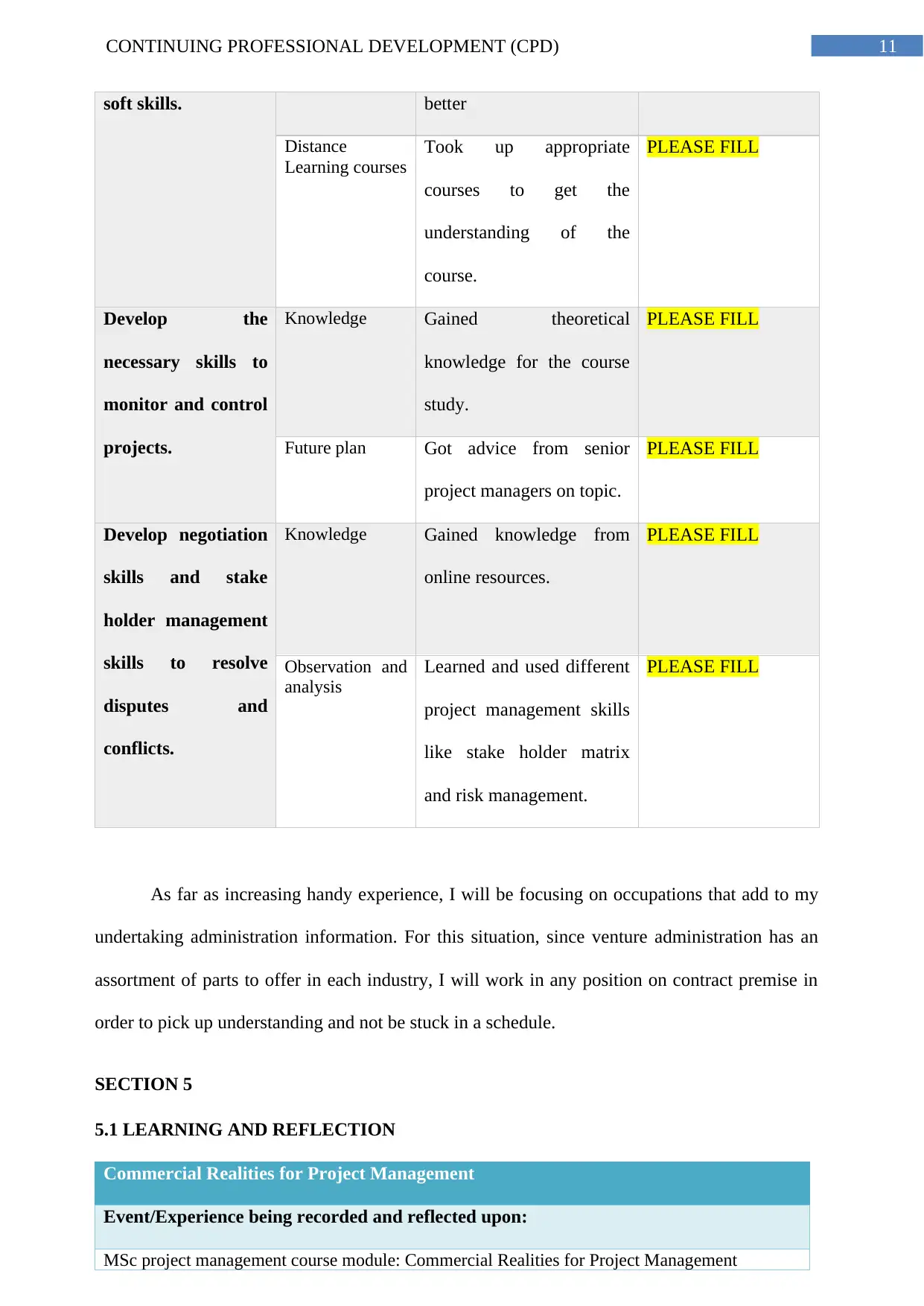
11CONTINUING PROFESSIONAL DEVELOPMENT (CPD)
soft skills. better
Distance
Learning courses
Took up appropriate
courses to get the
understanding of the
course.
PLEASE FILL
Develop the
necessary skills to
monitor and control
projects.
Knowledge Gained theoretical
knowledge for the course
study.
PLEASE FILL
Future plan Got advice from senior
project managers on topic.
PLEASE FILL
Develop negotiation
skills and stake
holder management
skills to resolve
disputes and
conflicts.
Knowledge Gained knowledge from
online resources.
PLEASE FILL
Observation and
analysis
Learned and used different
project management skills
like stake holder matrix
and risk management.
PLEASE FILL
As far as increasing handy experience, I will be focusing on occupations that add to my
undertaking administration information. For this situation, since venture administration has an
assortment of parts to offer in each industry, I will work in any position on contract premise in
order to pick up understanding and not be stuck in a schedule.
SECTION 5
5.1 LEARNING AND REFLECTION
Commercial Realities for Project Management
Event/Experience being recorded and reflected upon:
MSc project management course module: Commercial Realities for Project Management
soft skills. better
Distance
Learning courses
Took up appropriate
courses to get the
understanding of the
course.
PLEASE FILL
Develop the
necessary skills to
monitor and control
projects.
Knowledge Gained theoretical
knowledge for the course
study.
PLEASE FILL
Future plan Got advice from senior
project managers on topic.
PLEASE FILL
Develop negotiation
skills and stake
holder management
skills to resolve
disputes and
conflicts.
Knowledge Gained knowledge from
online resources.
PLEASE FILL
Observation and
analysis
Learned and used different
project management skills
like stake holder matrix
and risk management.
PLEASE FILL
As far as increasing handy experience, I will be focusing on occupations that add to my
undertaking administration information. For this situation, since venture administration has an
assortment of parts to offer in each industry, I will work in any position on contract premise in
order to pick up understanding and not be stuck in a schedule.
SECTION 5
5.1 LEARNING AND REFLECTION
Commercial Realities for Project Management
Event/Experience being recorded and reflected upon:
MSc project management course module: Commercial Realities for Project Management
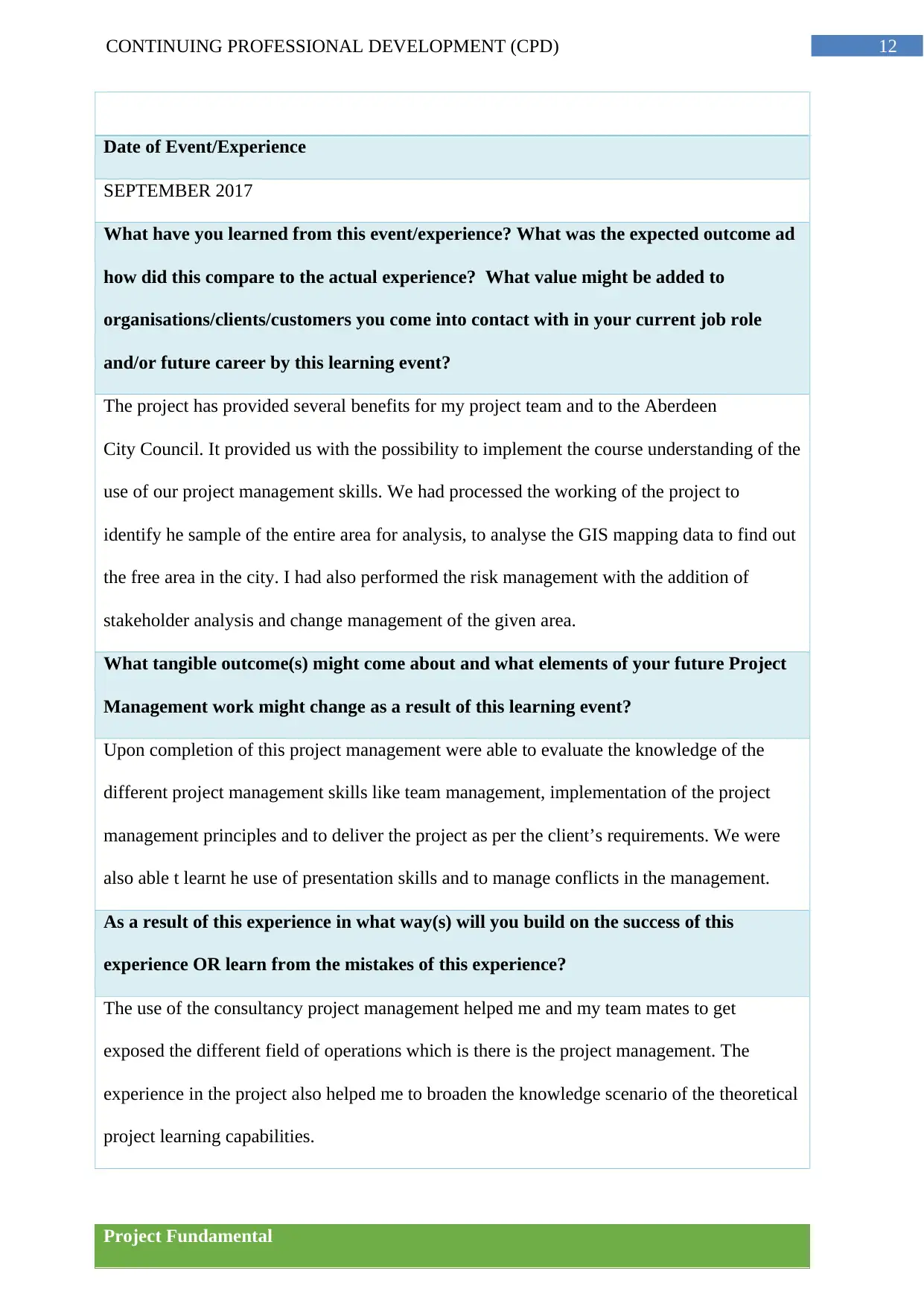
12CONTINUING PROFESSIONAL DEVELOPMENT (CPD)
Date of Event/Experience
SEPTEMBER 2017
What have you learned from this event/experience? What was the expected outcome ad
how did this compare to the actual experience? What value might be added to
organisations/clients/customers you come into contact with in your current job role
and/or future career by this learning event?
The project has provided several benefits for my project team and to the Aberdeen
City Council. It provided us with the possibility to implement the course understanding of the
use of our project management skills. We had processed the working of the project to
identify he sample of the entire area for analysis, to analyse the GIS mapping data to find out
the free area in the city. I had also performed the risk management with the addition of
stakeholder analysis and change management of the given area.
What tangible outcome(s) might come about and what elements of your future Project
Management work might change as a result of this learning event?
Upon completion of this project management were able to evaluate the knowledge of the
different project management skills like team management, implementation of the project
management principles and to deliver the project as per the client’s requirements. We were
also able t learnt he use of presentation skills and to manage conflicts in the management.
As a result of this experience in what way(s) will you build on the success of this
experience OR learn from the mistakes of this experience?
The use of the consultancy project management helped me and my team mates to get
exposed the different field of operations which is there is the project management. The
experience in the project also helped me to broaden the knowledge scenario of the theoretical
project learning capabilities.
Project Fundamental
Date of Event/Experience
SEPTEMBER 2017
What have you learned from this event/experience? What was the expected outcome ad
how did this compare to the actual experience? What value might be added to
organisations/clients/customers you come into contact with in your current job role
and/or future career by this learning event?
The project has provided several benefits for my project team and to the Aberdeen
City Council. It provided us with the possibility to implement the course understanding of the
use of our project management skills. We had processed the working of the project to
identify he sample of the entire area for analysis, to analyse the GIS mapping data to find out
the free area in the city. I had also performed the risk management with the addition of
stakeholder analysis and change management of the given area.
What tangible outcome(s) might come about and what elements of your future Project
Management work might change as a result of this learning event?
Upon completion of this project management were able to evaluate the knowledge of the
different project management skills like team management, implementation of the project
management principles and to deliver the project as per the client’s requirements. We were
also able t learnt he use of presentation skills and to manage conflicts in the management.
As a result of this experience in what way(s) will you build on the success of this
experience OR learn from the mistakes of this experience?
The use of the consultancy project management helped me and my team mates to get
exposed the different field of operations which is there is the project management. The
experience in the project also helped me to broaden the knowledge scenario of the theoretical
project learning capabilities.
Project Fundamental
⊘ This is a preview!⊘
Do you want full access?
Subscribe today to unlock all pages.

Trusted by 1+ million students worldwide
1 out of 24
Related Documents
Your All-in-One AI-Powered Toolkit for Academic Success.
+13062052269
info@desklib.com
Available 24*7 on WhatsApp / Email
![[object Object]](/_next/static/media/star-bottom.7253800d.svg)
Unlock your academic potential
Copyright © 2020–2026 A2Z Services. All Rights Reserved. Developed and managed by ZUCOL.




